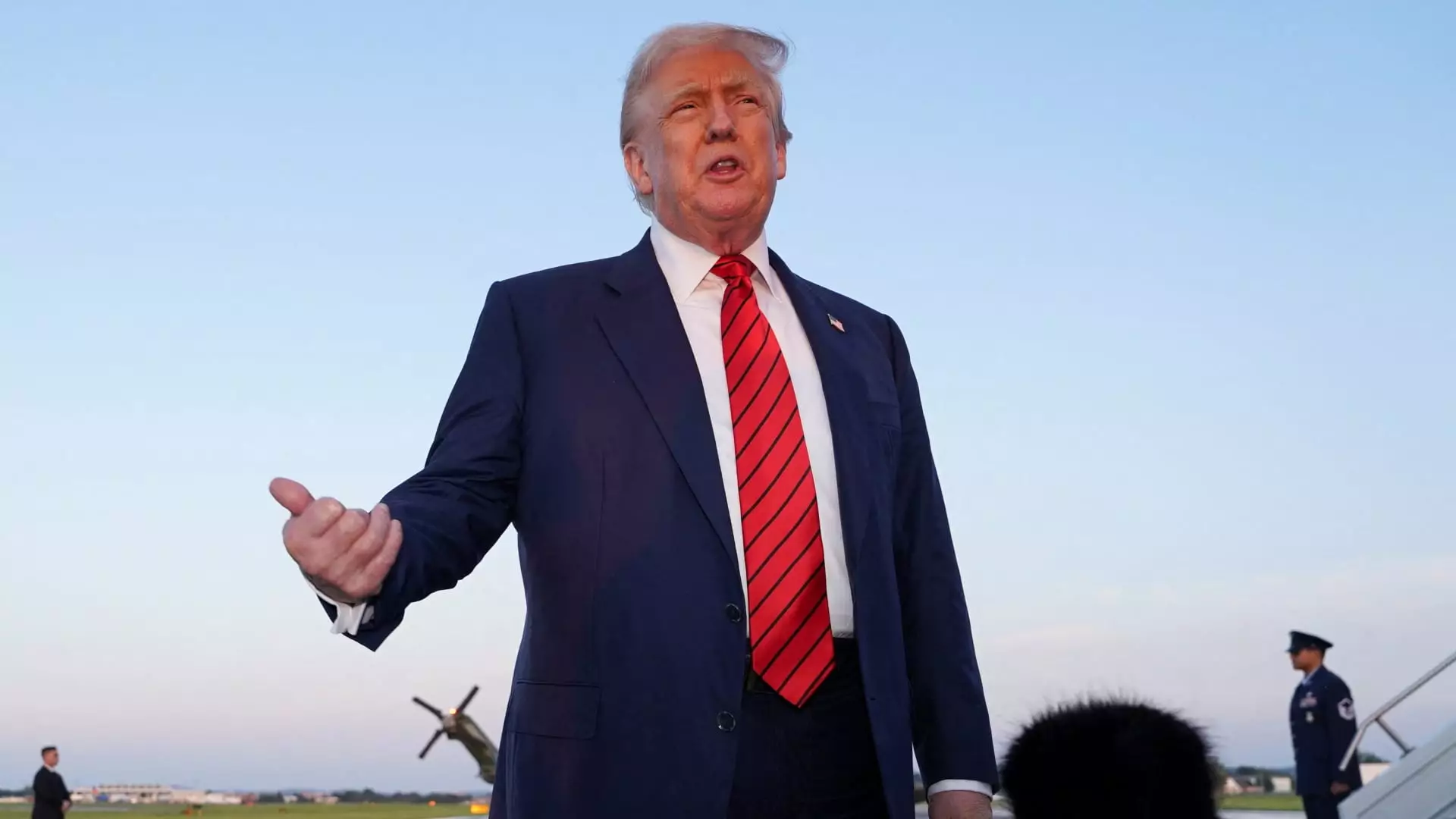President Donald Trump’s recent announcement of potentially astronomical tariffs—up to 250%—on imported pharmaceuticals exposes a dangerous flaw in his approach to policy. Cloaked under the guise of national security, these threats not only threaten to destabilize an already fragile industry but also blatantly ignore the complexities of global supply chains and innovation. By framing imports as security risks, Trump simplifies a multifaceted issue into a binary struggle, ignoring that global collaboration, not isolation, has historically driven pharmaceutical advancements. The invocation of Section 232, typically employed for steel or defense-related items, in the context of medicine reveals a shortsighted and opportunistic use of legal mechanisms to mask underlying economic and ethical concerns.
Such threats serve to undermine the intentional equilibrium that allows the U.S. to benefit from advanced medicines produced through international partnerships. Elevating tariffs to prohibitive levels risks encouraging drug shortages, increased prices, and reduced research investments. These outcomes threaten vulnerable populations, including seniors and those with chronic illnesses, who rely on affordable medications. Instead of fostering a resilient domestic manufacturing base, Trump’s rhetoric might push companies to relocate or withdraw from the U.S. market altogether, ultimately weakening the very security the tariffs claim to bolster.
Manufacturing Revival or Political Posturing?
President Trump’s assertion that tariffs will motivate pharmaceutical companies to bring manufacturing home is optimistic at best and disingenuous at worst. Although some firms like Eli Lilly and Johnson & Johnson have announced new investments, it would be naive to interpret these as direct benefits of Trump’s tariffs rather than driven by broader market realities. U.S. pharmaceutical manufacturing has been in decline for decades, driven by lower costs, innovation hubs abroad, and global supply chains that thrive precisely because of international cooperation.
Tariffs, however, threaten to inflate production costs and complicate regulatory and logistical frameworks. If anything, they serve as a deterrent rather than an incentive. The political calculus behind these threats seems more rooted in appealing to nationalist sentiments than pragmatic policy-making. It’s a calculated risk that could jeopardize U.S. medical supply chains—destabilizing an industry that underpins the health security of millions—merely to paint a picture of toughness. Realistic solutions require strategic, inclusive investment in domestic manufacturing, not tariffs that dismiss the nuanced realities of the global pharmaceutical landscape.
The Cost of Short-Term Populism on Long-Term Innovation
Trump’s push toward tariffs and aggressive measures like tying drug prices to lower foreign standards reflect a populist strategy aiming to appeal to domestic consumers tired of high drug costs. Yet, these tactics risk creating a detrimental environment for innovation. The pharmaceutical industry is driven by intensive R&D, long development cycles, and substantial investments—fundamentals that don’t thrive under constant political uncertainty and protectionist policies.
The executive order referencing a “most favored nation” approach to drug pricing exemplifies a misguided attempt to save money in the short term, but it disregards the structural financial realities of pioneering new medicines. If American pharmaceutical innovation is undermined by price controls and tariffs, the long-term consequence will be a slower, less competitive industry—one that is less capable of tackling future health crises. Instead of assuming that foreign lower prices are a zero-sum game, policymakers should recognize that investments in R&D and innovation are the backbone of a robust health sector, and that short-term cost-cutting can compromise long-term progress.
The Questionable Ethics of Weaponizing Healthcare
Leading with nationalistic rhetoric and threats of tariffs, Trump’s administration appears to view healthcare as a bargaining chip in economic negotiations. This approach not only risks alienating international allies and partners but also raises moral questions about exploiting health needs for political leverage. The pharmaceutical industry operates within a global network of research, manufacturing, and distribution—an ecosystem that benefits everyone when it functions collaboratively.
By threatening to impose draconian taxes on imported medicines, the administration jeopardizes patient access and safety. It suggests that political expediency outweighs the ethical obligation to ensure affordable, reliable access to life-saving drugs. Such strategies diminish the moral authority of U.S. health policy, turning it into a battleground for economic dominance rather than a shield for public health. This dangerous precedent may backfire, fostering distrust among allies and stakeholders who have long contributed to the collective progress of medical science.
—
Trump’s aggressive tariffs and policies on pharmaceuticals reveal a troubling tendency to prioritize short-term political gains over pragmatic, ethical, and sustainable solutions. By recklessly wielding economic threats, the administration risks crippling the industry, endangering public health, and sacrificing the long-term benefits of international cooperation. A more thoughtful, balanced approach rooted in investment and innovation, rather than protectionism and fear-mongering, is desperately needed to ensure that the promise of modern medicine remains intact for generations to come.


Leave a Reply